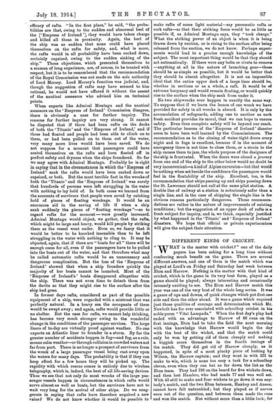RAFTS FOR SHIPWRECK. w - E are glad to see that one
of the recommendations of the Royal Commission in Canada which inquired into the sinking of the Empress of Ireland' is that rafts might be " placed in such a position on the upper deck " of liners that they would "float automatically as the ship sank." The recommendation is not set forth dogmatically ; it is only suggested that it "might be desirable to consider" whether such a scheme is feasible. The Commissioners recognize that the rafts would "have to be attached to the deck in such a way as to prevent them getting adrift in bad weather," but, they add, "the attachments might be of a simple kind which could be loosened in a very short time." In commenting on the loss of the Empress of Ireland' (Spectator, June 6th) we ventured to say :- " So far as the provision of boats is called in question by this latest calamity, we should say that the only lesson to be learned is that when a large ship sinks within a few minutes the one form of boat that can be relied upon is a self-launching craft—in other words, a raft that will float off as the vessel goes under. We mentioned this subject at the time of the Titanic' disaster, and we have never been able to understand why more attention has not been given to some such device as forming the whole of the highest deck of rafts that would be left floating when the ship had disappeared. It may be said that they would have to be bolted on to the deck, as no 'play' in the rafts could be allowed, and that directly you have bolts to attend to a form of launching in effect becomes necessary. We should think that rafts of saucer shape let into the deck would hold themselves rigidly in position with- out any kind of fastening; but however that may be, it is probably not beyond the wit of man to perfect the device."
In criticism of this proposal, Admiral Montagu wrote (Spectator, June 13th) that he did not believe in the
efficacy of rafts. "In the first place," he said, " the proba- bilities are that, owing to the sudden and abnormal heel of the ['Empress of Ireland they would have taken charge and killed all those in proximity. Again, the heel of the ship was so sudden that none could have placed' themselves on the rafts for safety, and, what is more, the rafts would in all probability have been sucked down, certainly capsized, owing to the sudden sinking of the ship." These objections, which presented themselves to a seaman of long experience, are, of course, to be treated with respect, but it is to be remembered that the recommendation of the Royal Commission was not made on the sole authority of Lord Mersey. Lord Mersey's function was judicial, and, though the suggestion of rafts may have seemed to him rational, he would not have offered it without the assent of the nautical assessors who advised him on technical points.
When experts like Admiral Montagu and the nautical assessors on the 'Empress of Ireland' Commission disagree, there is obviously a case for further inquiry. The reasons for further inquiry are very strong. It cannot be disputed that if there had been rafts on the decks of both the Titanic' and the Empress of Ireland,' and if these had floated and people had been able to climb on to them, or had been pulled on to them out of the water, very many more lives would have been saved. We do not suppose for a moment that passengers could have seated themselves on the rafts and been floated off in perfect safety and dryness when the ships foundered. So far we may agree with Admiral Montagu. Probably he is right in saying that in the circumstances in which the Empress of Ireland' sank the rafts would have been sucked down or capsized, or both. But the most terrible fact in the wrecks of both the Titanic' and the Empress of Ireland' was surely that hundreds of persons were left struggling in the water with nothing to lay hold of. In both cases we learned from the accounts of survivors that people were saved by catching hold of pieces of floating wreckage. It would be an enormous aid in the saving of life if when a ship sank suddenly the pieces of "floating wreckage "—so to regard rafts for the moment — were greatly increased. Admiral Montagu would object, we gather, that the rafts, which might be large and heavy, would kill people by striking them as the vessel went under. Even so, we fancy that it would be better to be knocked insensible than to be left struggling in the water with nothing to cling to. It may be objected, again, that if there are " boats for all " there will be enough room for all, even if the passengers have to be pulled into the boats out of the water, and that therefore what may be called automatic rafts would be an unnecessary and dangerous complication. But the loss of the 'Empress of Ireland' showed that when a ship founders quickly the majority of her boats cannot be launched. Most of the 'Empress of Ireland's' boats disappeared altogether with the ship. There was not even time to detach them from the davits so that they might rise to the surface after the ship had gone.
In former days rafts, considered as part of the possible equipment of a ship, were regarded with a mistrust that was perfectly natural. In a heavy sea the occupants of them would be swept away ; and again, rafts would provide little or no shelter. But the case for rafts, we cannot help thinking, has become very much stronger owing to the wonderful change in the conditions of the passenger services. The large liners of to-day are virtually proof against weather. No one expects an Atlantic liner to founder in a storm. By far the greater number of accidents happen in fog—and fog, as a rule, means calm weather—or through collision in crowded waters not far from port. There is no longer a prospect of survivors from the wreck of a large passenger vessel being cast away upon the waters for many days. The probability is that if they can keep afloat for a few hours they will be picked up. The rapidity with which rescue comes is entirely due to wireless telegraphy, which is, indeed, the best of all life-saving devices. Thus we see that not only do most wrecks of the large pas- senger vessels happen in circumstances in which rafts would serve almost as well as boats, but the survivors have not to wait very long for the arrival of other ships. Do we exag- gerate in saying that rafts have therefore acquired a new value? We do not know whether it would be possible to make rafts of some light material—say pneumatic rafts or cork rafts—so that their striking force would be as little as possible if, as Admiral Montagu says, they " took charge." What the striking power of an object is when it is being drawn down by suction, or is rising to the surface after being released from the suction, we do not know. Perhaps experi- ments would lead to a precise enough knowledge of the subject. The most important thing would be that they should act automatically. If there were any bolts or rivets to remove —anything at all in the nature of launching gear—these should be as simple as possible, but it would be better that they should be absent altogether. It is not an impossible ideal that the entire upper deck of a large liner should be, whether in sections or as a whole, a raft. It would be of extreme buoyancy and would remain floating, or would quickly rise to the surface when the ship sank from under it.
No two shipwrecks ever happen in exactly the same way. To suppose that if we learn the lesson of one wreck we have provided for safety in all wrecks is absurd. It is only by the accumulation of safeguards, adding one to another as each fresh accident provides its moral, that we can hope to ensure safety. Even then complete safety will be beyond our reach. The particular lessons of the Empress of Ireland' disaster seem to have been well learned by the Commissioners. The recommendation as to the closing of water-tight doors every night and in fogs is excellent, because if in the moment of emergency there is not time to close them, or a strain to the ship causes them to jam, the whole purpose of the designers of the ship is frustrated. When the doors were closed a journey from one end of the ship to the other below would no doubt be very inconvenient—a kind of Alpine excursion—but that would be nothing when set beside the confidence the passengers would feel in the floatability of the ship. Excellent, too, is the recommendation that ships passing up and ships passing down the St. Lawrence should not call at the same pilot station. A double line of railway at a station is notoriously safer than a single line, and in the case of shipping the single line is for obvious reasons particularly dangerous. These recommen- dations are rather in the nature of improvements of existing conditions ; but the suggestion of an upper deck of rafts is a fresh subject for inquiry, and is, we think, especially justified by what happened in the ' Titanic' and Empress of Ireland' disasters. We hope that official or private experimenters will give the subject their attention.











































 Previous page
Previous page